Today, Feathered Quill reviewer Skyler Boudreau is talking with Guy Sibilla, author of Boarding Passes to Faraway Places.
FQ: During your travels, did you ever go somewhere you would never return to? Are there any places you have not visited that you have no interest in exploring?
SIBILLA: Countries, cultures, societies, and boundaries between or within nations are constantly shifting and reshaping themselves. The consequence of which means even after visiting a place, I have never held a cross-it-off-the-list attitude because nothing and no one ever remains the same. Not only does time and experience change me but also time changes the people and places I have visited. If you travel with insight you will always find delight and surprise.
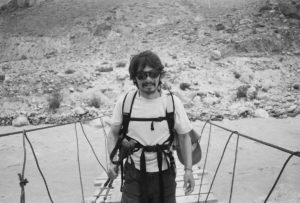
If I had to pick a place (or places) I would want to return to visit, Damascus, Aleppo and Palmyra leap to mind. I travelled across Syria and other parts of the Fertile Crescent just before that beautiful region was thrown into unimaginable suffering. While there I met some kind, clever, hopeful and welcoming Syrians with whom I lost all contact once the internet was closed. (See my chapter entitled “The Roads Through Damascus” for more.) In spite of it all, I am still left with the hope of finding my friends alive. I would relish the opportunity to prepare a reunion dinner for them, listen to their stories, rejoice in their survival and then roll up my sleeves and do whatever I could to help them as my small way of repaying their kindness to me so many years ago.
I wish I could see it all. I accept the realization that I will die well before I am able to see the world as deeply and richly and in all the diversity that it has to offer. I have made a real run at it (I think). Perhaps more than most. But the more you experience the vast and mysterious differences as well as the sameness we as humans share as sentient beings, the harsh cold and bitter winds blowing along the high ice of the Karakoram, the unrelenting dryness of the earth’s deserts, the biodiversity of the equatorial jungles, the more you lament all that you have left undone. When you travel like I do, not with the idea to see places but to simply move among the people that inhabit our world, you are left with an insatiable longing. You can never acquit yourself of the sense that the wonders of our world are a vanishing horizon. The more you move toward it, the farther away the mystery lives.
FQ: Do you ever get tired of being on the move? How do you deal with travel exhaustion while working on an assignment?
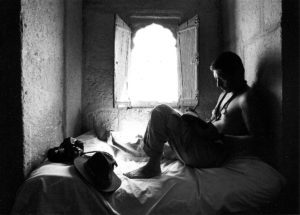
SIBILLA: That one is easy; yes. There have been times I have awakened and asked myself “How in heaven’s name did I get here?” That was precisely the self-inquisition that rifled through my head one morning as I awoke along a waterway in a lean-to made of palm fronds in the upper Sepik River of Papua New Guinea. Being alone on the road though does give you a priceless gift; an enormous amount of time for introspection. Even when I miss familiar flavors and voices and colors and sounds, every morning when I step out into a new place, I get to say, “Wow! I get one more of these!”
The simplest cure for travel lethargy is a good martini. I once jump over a bar in India to demonstrate how to make my version of a perfectly, lovely, dry gin martini with a twist. As a general rule I have found people in bars, especially people in bars who belong to a country other than that within which the bar is located, interesting. Somerset Maugham’s fabulous travelogue entitled The Gentleman in the Parlour is a great source of inspiration when I feel a little weary. I mean, no matter how tired or isolated or alone I have felt, when I stopped to consider that unlike everyone else in the world I knew, only I was waking up in a Tibetan Monastery near the Nepalese border or on safari in Botswana or in Afrique de l’ouest Française, how then, can you not say, “How lucky am I?”
FQ: You describe Boarding Passes to Faraway Places as a collection of “travelogues chiefly about the act of movement itself.” (xviii) Why did you choose this aspect of traveling to focus on?
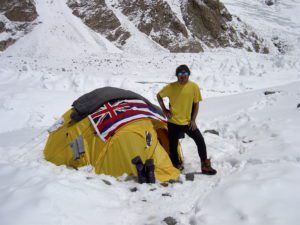
SIBILLA: In my lifetime thus far, I have lived (ie. received mail, voted, had friends), in Germany, Italy, North America and Japan. Consequently, before I was in my teens, I had already spent half on my life overseas. While tourist attractions may be appealing, people fascinate me more. When I turn left on a small road and by-past tourism industry highlights, that is usually where the adventure begins. It does take courage to strike out alone without a plan. But my family provided to me the kind of stability, confidence and love that allowed me to travel without fear of the unknown.
Take for instance my father and mother. He was of Italian descent and served for 25 year in the United States Army retiring honorably as an officer. She was of Japanese descent born in Hawaii and when ordered to do so, they took myself and my siblings to live in a Cold War West Germany. Instead of living on base, my father requested to live in Gerbrunn, a suburb of Würzburg. His plan was straightforward; we would never learn about German culture and its people unless we lived within the German community. So, we did. We rented a house, learned German in school and shopped in local German markets. Now imagine a half-Japanese half-Italian elementary-age school boy speaking German in a store to a clerk as his Japanese-American mother asked him to ask her how much something cost? If you can do that as a kid, what experience can you fear as an adult?
FQ: I love the meandering, wandering journeys you describe in Boarding Passes to Faraway Places! Was there ever a time you followed pre-designed travel plans, or have you always been more of a free spirit?
SIBILLA: You have to understand that my preparation for any journey never began with a traditional travel service. I searched the U.S. State Department’s publications for developing countries, usually those on the Alerts and Warnings list. I would order old publications of National Geographic and use them as primers. I would read portions of the Columbia History of the World and see what significance a place or a people may have played in the development of humankind. I made lists of places inspired by my reading as a young man (Joseph Rudyard Kipling, Captain Sir Richard Francis Burton, Freya Stark, Graham Green, Beryl Markham and many others) and included them. This kind of approach doesn't lead to set tours because most of these places have no infrastructure that attracts tourists.
In fact, The Lonely Planet guidebooks were essential for an off-the-beaten-path traveler because they had maps drawn by other travelers of places that had no maps to begin with. Tony and Maureen Wheeler (owners and publishers) are my heroes.
FQ: What are some of the challenges you face when entering a country for the first time?
SIBILLA: Whenever I head out, I always envision that first moment when I step out of the airport, train station, bus station, taxi stand, or whatever, and I find myself awash in the assault of sounds that come at you screaming for your attention. All my head is focused on are the basic ones I lump into the bottom basket of Maslow’s Hierarchy of Needs; a roof and sustenance. That’s when I usually find myself being greeted by two of my constant road companions: dust and confusion. Miraculously, it always tuned out well.
FQ: What is the most rewarding part of your work?
SIBILLA: There is nothing, and I emphasize nothing, that is more rewarding than when I receive a card, a note, a letter, a text, a Facebook post, containing words from readers who indicate that my book inspired them to go somewhere or to try a different approach to travel or that one of my stories reminded them of one of their own experiences.
Writing is such a solitary process and as you write, you constantly question yourself. During the process of writing (and rewriting) Boarding Passes to Faraway Places, there were multiple times I wondered; “Is this effort worth it? Am I saying anything worth saying? Will anyone care what I am saying?” Thus, a few encouraging words from friends and strangers alike, notes of support, letters asking when my next book is coming out, provide the much-needed affirmation that makes it all worth the while.
FQ: You seem to spend a lot of time stumbling into new friends on your journeys. Is it ever difficult to stay connected with them afterwards?
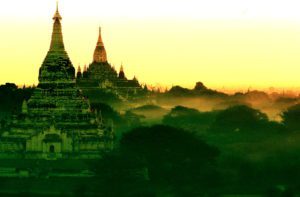
SIBILLA: Yes. Enormously so. A huge portion of the world lives at an entirely different level than what we all assume as “normal.” For instance, it is estimated that 3 billion people wake up every day and cook with coal or wood. With that as a marker, the idea of trying to keep contact via anything other than postal services is hard to imagine. This doesn’t consider the enormous costs of electronic communication if it is even available. I can say though, that I admire postal services across the planet as my family and friends can attest as mail has found its way to them from some distinctly faraway places.
FQ: What is the best piece of advice you could give to aspiring travel writers?
SIBILLA: Read everything. Go to movies. Listen to all kinds of music. Eat food at a different place once a month. Take dance lessons. Tell stories to friends. Take a night school class. And mostly, do something, one thing, every day the scares you. These things are the bricks for expressing yourself in your writing.
FQ: In Boarding Passes to Faraway Places, you say “Sometimes the path chooses you.” (106) When discovering your own path, did you ever question if it was the right one for you? How do you overcome such doubts?
SIBILLA: Let’s dissect that statement and see if we can draw out some meaning. On first blush, the message is to open yourself up to doing things not in the book, or on the map, or on the itinerary, or in the schedule. It is the actual fact of moving across a place by following your nose instead of looking for something. For instance, why go to a café that is on the “Top Ten List” of blah blah cafés in [insert country name here]? Maybe, the more memorable experience will come from eating at the same place as the ticket agent at the train station. Or the part-time desk clerk at your rooming house. Or the taxi driver who dropped you somewhere. I have found these people always know where well-prepared fresh food is served at a fair price and local people who share fun stories. I have found that people are as curious about you as you are of them.
On a deeper level, I am asking that you open yourself up to your own journey. This is not about the physical world so much as it is about your inner one. I travel to face my own fears as well as my fears of other people or places or things. Most of our ideas are shaped by fear so I travel to face them and it is hoped by doing so, release them. In the end, I have made friends, enjoyed food and acquired an understanding of many beliefs by allowing the path to take me to where I might not have otherwise consciously chosen to go.
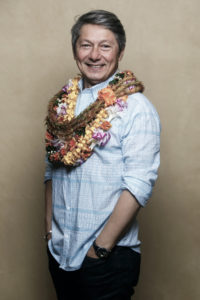
FQ: Have you ever had a traveling experience that scared you? How has that experience affected you?
SIBILLA: Each journey at some time in their own way to some degree presented a moment or a series of moments of fear. Whenever I find myself on a path not planned, there are always moments of insecurity (shall we call them?). By definition something “unplanned” is “unanticipated,” “unintended,” or “accidental.” For me I ask “Why go if I don’t choose to leave my comfort zone?”
Therefore, I faced such exciting existential questions as: Will this bridge collapse when I am halfway across? Does my guide know where he is going? Does this guy even have a driver’s license? When was the last time this airplane was serviced? How much baksheesh will it take to get me across this border? Or past this road block? These and experiences like these taught me over time to abide by my instincts. I learned to trust my inner voice whispering inside of my head. That voice was almost always right. In the end, my experiences taught me self-reliance in ways I could only have learned from having the bejeezus scared out of me. (Lie the time I watched a tarantula the size of a “moped” walk toward me as I sat on a wooden latrine in the middle of jungle in Belize. To see how that ends, have a look at the chapter entitled, “Watching Who Crossed the Hondo.”) GS


No comments:
Post a Comment